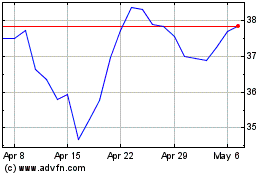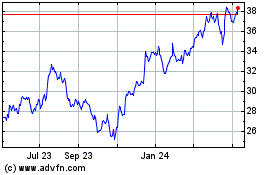BofA Executive Leaves Firm
November 28 2015 - 3:02AM
Dow Jones News
(FROM THE WALL STREET JOURNAL 11/28/15)
By Jenny Strasburg
LONDON -- A senior manager who helped oversee controversial
tax-focused trading strategies in Bank of America Corp.'s equities
division is leaving the bank.
Monuhar Ullah, who joined Bank of America in 2008 from Barclays
PLC, was the most senior London-based executive of the group that
until recently was called Structured Equity Finance and Trading.
That unit has generated hundreds of millions of dollars in revenue
for the U.S. lender arranging specialized trades that helped
clients reduce withholding taxes on stock dividends, according to
internal documents reviewed by The Wall Street Journal.
SEFT was dismantled in a recent reorganization of the equities
division, according to people familiar with the bank. Besides doing
tax-focused trades -- a large chunk of its business -- SEFT helped
clients including other large banks and corporations obtain margin
loans and finance their stockholdings using derivatives, according
to the people and documents.
Following the restructuring that resulted in SEFT's breakup, Mr.
Ullah recently had fewer than a dozen employees reporting to him,
according to a person familiar with the matter.
Mr. Ullah, a managing director, advised on tax-related aspects
of a range of stock-trading and investment strategies, according to
internal documents and people familiar with the business. His
departure is tied to further restructuring moves that haven't yet
been announced, one of the people said.
Mr. Ullah declined to comment when reached on his mobile phoneon
Friday. A Bank of America spokesman confirmed his departure.
The restructuring of SEFT has followed upheaval in businesses at
the core of the unit and broader changes to the bank's markets
business globally.
So-called dividend-arbitrage tax strategies such as those
implemented by SEFT have come under pressure from U.S. and European
regulators, some of whom are concerned about whether the trades
have improperly helped banks and their clients avoid dividend
taxes.
Authorities in Denmark, Germany and the U.K. have been
investigating whether numerous banks, hedge funds, brokerage firms
and other market participants inflated tax-related claims tied to
stock dividends in ways that improperly generated tax rebates or
credits, according to people familiar with investigations under way
and comments made publicly by prosecutors in Denmark and
Germany.
One focus of their attention has been a now-defunct subset of
dividend-tax trades that went by the moniker "cum/ex," referencing
terms describing shares' status before and after dividend payments.
Those trades were carefully timed to take advantage of
market-structure quirks affecting how trading and tax-withholding
systems assigned ownership to shares before and after dividend
dates.
As the Journal previously reported, Bank of America has been
scrutinizing cum/ex trades it facilitated in past years tied to
certain markets, including Germany.
The cum/ex variety of German dividend trades became largely
obsolete in 2011 amid scrutiny by tax authorities and stricter
enforcement of derivative-trading rules, according to lawyers,
traders and brokers familiar with the strategies.
Bank of America hasn't commented on the various tax probes. Mr.
Ullah advised on trades by Bank of America that are among those
under scrutiny by tax authorities and regulators, according to
people familiar with the matter. There's no indication his
departure is connected to any investigation.
London has been the center of dividend-arbitrage activity for
most of the past decade, according to market participants and
documents detailing fund strategies and specific trades.
Most dividend-arbitrage trades aren't illegal, but they stoke
debate among bank lawyers, executives and regulators about the
reputational risks tied to any transactions designed to minimize
taxes.
Bank of America, like other banks, has continued to do
dividend-tax trades, though the bank has been questioned by U.S.
regulators concerned about its management of reputational risks,
The Journal has reported.
The tax trading strategies broadly have become less prevalent
and less profitable in recent years, market participants say.
Subscribe to WSJ: http://online.wsj.com?mod=djnwires
(END) Dow Jones Newswires
November 28, 2015 02:47 ET (07:47 GMT)
Copyright (c) 2015 Dow Jones & Company, Inc.
Bank of America (NYSE:BAC)
Historical Stock Chart
From Mar 2024 to Apr 2024

Bank of America (NYSE:BAC)
Historical Stock Chart
From Apr 2023 to Apr 2024
